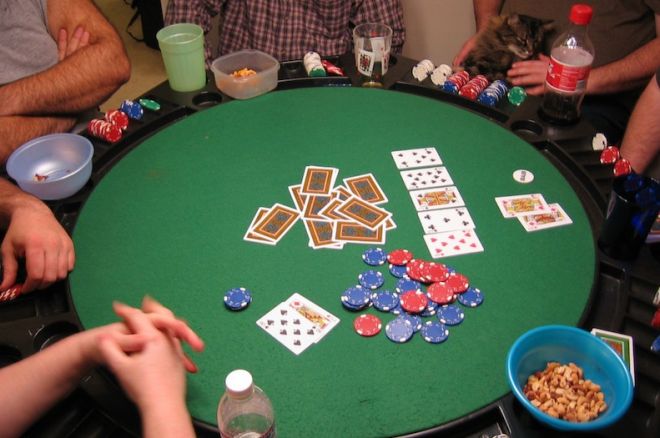Strategy for Home Poker Games -- It��s Not What You Think

I was invited to be a guest on a recent episode of the Top Pair podcast, which focuses primarily on home poker games. The experience got me thinking about the ways in which home games are different from casino games, and, in particular, what you have to do differently to succeed in home games.
It is a truth about poker �� so much so that it��s nearly a clich�� �� that it��s all just one long game. But where the rubber meets the road, that is more true for home games than for casino poker. In casinos, though there will be some regulars that you see many times, most of your opponents will be strangers with whom you play only once. But in home games, you can expect the lineup to stay constant for months or even years. That fact makes an enormous difference.
When you��re playing in a casino, you don��t have to worry about being able to come back. Of course you can come back, anytime you want, provided that your conduct has not been so egregiously bad that you get 86��ed. But at a home game, you have to be invited to return.
One goal, then �� a primary one, in fact �� when attending a home game is to get invited back to play again. The game cannot be a long-term source of profit for you if you��re not invited back.
The first time I attended a home poker game, I completely failed at this task. I made some decent money, but it was one-and-done. When I got a group email announcing the next game and answered it expressing my interest, the host quickly replied, telling me that I had been included in the email list by mistake, and asking me not to show up. I never learned who I had offended, or how, but clearly I had screwed up, and turned a potential ongoing revenue stream into a one-time memory.
Some time after that �� after moving to a new city �� I blew it again. I was having breakfast by myself at a restaurant, when a man at the next table noticed my PokerStars sweatshirt and started chatting with me on his way to the exit. I learned that he was a long-time participant in a local game played at a country club. My impression was that the stakes, game selection, and competition would likely hit my sweet spot of advantage. I turned from being annoyed at his intrusion into my quiet meal to hoping he��d invite me to play.
It was not to be. This time, though, I know exactly how I messed up. He asked me whether I played tight or loose. I didn��t think about the consequences of answering truthfully, and told him that I usually have a classic tight-aggressive style. He responded by launching into a lecture about how tight players ruin the game. They��re there to have fun, he explained, and it��s no fun to have somebody who folds, folds, folds, and puts money in only when they have a lock on the hand. Pretty quickly, he drew the conversation to a conclusion �� without inviting me to join in.
Which leads to the first point about how to get invited to a game �� or invited back after your first time: give action. Nits are no fun. If you��re no fun, you��re less likely to be given the nod to play again.
This doesn��t mean that you need to go to the other extreme and become the table maniac. But you should strive to be at least averagely active �� especially your first time or two at a particular game. It certainly wouldn��t hurt to be caught bluffing once in a while. Rebuy conspicuously, and frequently if needed. Don��t hit and run if you make an early profit, but help keep the game going as long as other people �� and the host �� want it to.
The other key to being invited back is to be sociable. Again, these people come together to play because it��s fun. If you��re not enjoyable to spend time with, why would they choose to have you around?
To that end:
- Learn people��s names �� and call them by name so that they know you remember them.
- Bring food or drinks.
- Take an interest in the people sitting around the table. With any luck, they will become your friends.
- Never criticize how somebody else plays, or advise them on how to play better. They didn��t invite you there to give lessons.
- If you win a big pot, don��t boast about how well you played it. Instead, be humble and emphasize how lucky you got.
- If you lose a big pot, be a good sport about it.
- Laugh at people��s jokes, and make a few of your own.
- Don��t critique how the game is run, or suggest improvements or modifications, at least until you��ve been going long enough that you��re an established regular.
- Look for small ways to make the game go more smoothly, such as being quick and eager to make change, taking extra turns shuffling, etc.
- If a dispute arises, be your most diplomatic self. Let the host and regulars settle the matter however they��re accustomed to handling such things, even if it isn��t ��by the book�� or the way a casino would resolve it.
- Don��t flaunt your knowledge of rules, strategy, history, or current events related to poker. Such displays do not impress, but intimidate others who are not as deeply steeped in the game, and being intimidated is incompatible with having fun.
- If you��re allowed to bring guests, make sure they are people who will similarly add to the conviviality of the game, not be wet blankets or boors.
- Be profuse in your appreciation to the host(s) for opening their home to you.
If you do these things, you will likely be a welcome participant over the long run, even if you simultaneously achieve your other goal of taking more money out of the game than you put in. Recreational players like to win, of course, but don��t much mind losing to somebody who makes the game a pleasure to be a part of. Being that person is your primary task as a home game player.
(By the way, if you��re curious to hear me on Top Pair, I��m on the April 4, 2015 episode.)
Photo: Shad Bolling. Creative Commons Attribution 2.0 Generic.
Robert Woolley lives in Asheville, NC. He spent several years in Las Vegas and chronicled his life in poker on the ��Poker Grump�� blog.
Get all the latest PokerNews updates on your social media outlets. Follow us on Twitter and find us on both Facebook and Google+!








